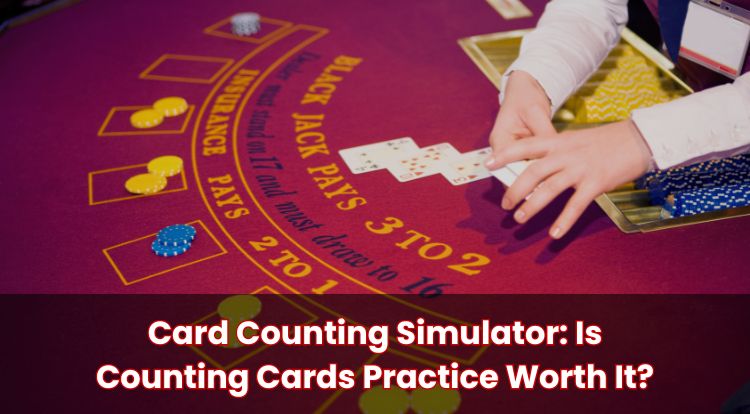Card Counting Poker: Can You Count Cards in Poker Games?
Card counting is one of the most talked-about techniques in gambling. You may have heard of it in connection with blackjack, where some skilled players may attempt to keep track of cards that have been dealt. But what about poker? Can the same method be used to try and gain an advantage there?
This guide takes a clear look at how card counting actually works, why it applies to blackjack, and why poker is a very different story.
If you are curious about how cards, betting, and decision-making interact in these games, you will find straightforward explanations here. By the end, you will understand the difference between counting cards and using the information that poker genuinely allows.
What Does Card Counting Actually Mean?
Card counting is a technique used in blackjack where players try to keep track of the types of cards that have already been dealt. The idea is that by knowing what has gone, they can estimate what is left in the shoe.
To do this, players often use a simple system where they assign values to cards—adding points for some and subtracting for others—so that they carry a running total in their head. This number does not reveal which card will appear next. It only provides a rough indication of whether the remaining deck may contain more high or low-value cards. Blackjack is still a game that involves chance, and card counting cannot remove that uncertainty.
Can You Count Cards in Poker?
Poker works differently. In games such as Texas Hold’em and Omaha, each hand begins with a freshly shuffled deck. After the hand is completed, the cards are gathered and shuffled again. This means there is no running memory of the deck across multiple deals.
As a player, you only see:
- Your two private cards (hole cards).
- The shared community cards on the table.
The rest remain unseen. Players often talk about “outs”, which are the specific cards that could improve their hand in that round. Calculating outs can help you estimate the likelihood of completing a possible winning hand. This is not the same as card counting. It is a probability calculation that applies only within that single deal.
Why Card Counting Works in Blackjack but Not in Poker
Blackjack is usually dealt from a shoe containing several decks of cards. Cards are not shuffled back in after each round, so the composition of the shoe gradually changes. Because all players can see which cards have already been played, it becomes possible to track whether the remaining decks may be richer in high or low cards. This is why card counting has meaning in blackjack.
Poker, by contrast, is restarted each hand. The deck is shuffled and reset, so the distribution of cards has no connection to previous rounds. Furthermore, most of the cards in poker remain hidden in opponents’ hands or folded unseen, which makes building a long-term count impossible.
How Poker Betting Structures Affect Card Counting
Poker betting structures help shape how the game is played, but they do not make card counting workable.
- Fixed-limit poker: Bets and raises are set at pre-determined amounts, such as £2 in early rounds and £4 in later rounds.
- Pot-limit poker: Bets can be any size up to the amount already in the pot.
- No-limit poker: A player can bet any amount up to their total stack, which may lead to very large pots in some hands.
These formats change how players choose their bet sizes and apply pressure, but none of them create opportunities to build a count across hands. Each deal begins from the same starting point: a fully shuffled deck.
Does Card Counting Provide Any Real Edge in Poker?
In the classic blackjack sense, card counting provides no edge in poker. Since the cards are reset each hand, there is no cumulative advantage to be gained by tracking.
What can help in poker is probability and logic within the hand being played. For example, if you have four cards to a flush after the turn in Texas Hold’em, you know there are nine cards left in the deck that could complete your flush. By weighing the odds of receiving one of those cards against the size of the pot, you can decide whether to continue.
This kind of calculation is an accepted and essential part of poker strategy. But it is not card counting—it is working with the information that the current hand provides.
Other Factors That Influence Poker Success
Poker outcomes are a mix of skill and chance. Over time, certain areas may help make a difference:
- Knowledge of hand rankings and betting rules: Knowing that a flush beats a straight, or how raises work, can help you make better decisions.
- Observation of opponents: Bet timing, sizing, and behaviour can suggest whether someone may be strong or weak.
- Table position: Acting later in the betting order allows you to see what others do before you decide.
- Managing your budget: Setting limits on how much you are prepared to play with can help you stay measured.
- Experience: The more situations you encounter, the quicker you may recognise potential patterns and options.
Is Card Counting Allowed in Poker Games?
In poker, remembering cards that have been shown during a hand is part of normal play. For example, in Seven-Card Stud you might note which of your opponents’ upcards have already been dealt, as this affects which cards could still appear. This is considered fair because it relies only on observation.
What is not allowed is the use of devices, software, or written notes to track information beyond human memory. In the UK, licensed poker rooms and online operators use shuffling machines or Random Number Generators (RNGs) to ensure fairness. Attempting to cheat by using outside tools can potentially result in exclusion or a ban.
Poker and blackjack are games that involve chance, and no method can remove that uncertainty or guarantee consistent winnings.
If you decide to play, it can help to set a budget you are comfortable with and to take time away from the table if it starts to feel overwhelming. Poker is about making decisions with incomplete information, not about securing results.
Licensed UK operators must ensure their games are fair and provide tools like deposit limits and time reminders, which you can use to help manage the way you play.
*All values (Bet Levels, Maximum Wins etc.) mentioned in relation to these games are subject to change at any time. Game features mentioned may not be available in some jurisdictions.
**The information provided in this blog is intended for educational purposes and should not be construed as betting advice or a guarantee of success. Always gamble responsibly.





